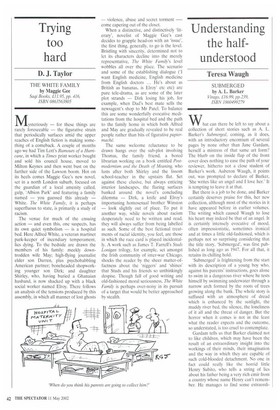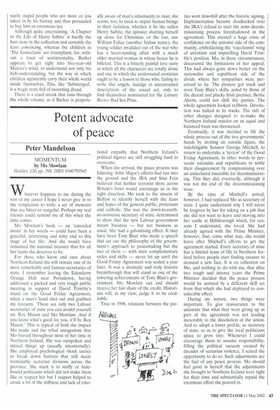Understanding the half understood
Teresa Waugh
SUBMERGED by A. L. Barker Virago, £16.99, pp.239, ISBN 1860499279 What can there be left to say about a collection of short stories such as A. L. Barker's Submerged, coming, as it does, with an introductory encomium of several pages by none other than Jane Gardam, herself a mistress of that same art form? The blurb on the inside flap of the front cover does nothing to ease the path of your reviewer, hitherto not a close student of Barker's work. Auberon Waugh, it points out, was prompted to declare of Barker, She writes like an angel and I love her.' It is tempting to leave it at that.
But there is a job to be done, and Barker certainly deserves praise for this, her new collection, although most of the stories in it have appeared before in earlier volumes. The writing which caused Waugh to lose his heart may indeed be that of an angel. It is certainly intensely evocative of mood, often impressionistic, sometimes ironical and at times a little old-fashioned, which is perhaps not so surprising considering that the title story, 'Submerged', was first published as long ago as 1947. For all that, it retains its chilling hold.
'Submerged' is frightening from the start with its description of a young boy who, against his parents' instructions, goes alone to swim in a dangerous river where he tests himself by swimming underwater through a narrow arch formed by the roots of trees growing along the bank. The whole story is suffused with an atmosphere of dread which is enhanced by the sunlight, the muddy river bed, the silence, the loneliness of it all and the threat of danger. But the horror when it comes is not in the least what the reader expects and the outcome, so understated, is too cruel to contemplate.
Gardam tells us that Barker claimed not to like children, which may have been the result of an extraordinary insight into the workings of their minds, their imagination and the way in which they are capable of such cold-blooded detachment. No one in fact could really like the horrid little Henry Subito, who tells a string of lies about his father being a very rich emir from a country whose name Henry can't remember. He manages to find some extraordi
narily stupid people who are more or less taken in by his fantasy and thus persuaded to buy him an enormous tea.
Although quite entertaining, 'A Chapter in the Life of Henry Subito' is hardly the best story in the collection and certainly the least convincing, whereas the children in 'The Iconoclasts' are triumphant, for, without a trace of sentimentality, Barker appears to get right into five-year-old Marcus's mind, to understand not only his half-understanding, but the way in which children apparently carry their whole world inside themselves. This, like 'Submerged', is a tragic story full of mounting dread.
There is a cruel streak that runs through the whole volume, as if Barker is perpetu ally aware of man's inhumanity to man; she seems, too, to need to depict human beings in their isolation, whether it be the sullen Henry Subito, the spinster shutting herself up alone for Christmas, or the lost, raw William Felice (another Italian name), the young soldier invalided out of the war who has a heart-rending affair with a much older married woman in whose house he is billeted. This is a bitterly painful love story in which all the characters are totally alone and one in which the understated eroticism ought to be a lesson to those who, failing to write like angels, indulge in unrestrained descriptions of the sexual act, only to find themselves nominated for the Literary Review Bad Sex Prize.







































































 Previous page
Previous page